
Small-cell lung cancer (SCLC) makes up about 10 - 15% of all lung cancer diagnoses, and is caused by smoking and inhaling second-hand smoke. This is an aggressive type of cancer that spreads quickly, and recurs extremely frequently after patients undergo chemotherapy treatments. Treatments for SCLC have not changed much in the past 30 years, but a team of researchers led by the Fred Hutchinson Cancer Research Center in Seattle has been investigating potential new therapy methods for the cancer and recently uncovered a gene that has the potential to be used in biology-based treatments for SCLC. (Image courtesy of Lindsay Fox via Wikimedia Commons and EcigaretteReviewed)
Read More
Tags:
Fred Hutchinson Cancer Research Center,
WA,
cancer research,
Seattle,
Hutch,
2016,
Fred Hutch,
BioResearch Product Faire,
Western,
small-cell lung cancer,
L-Myc,
SCLC
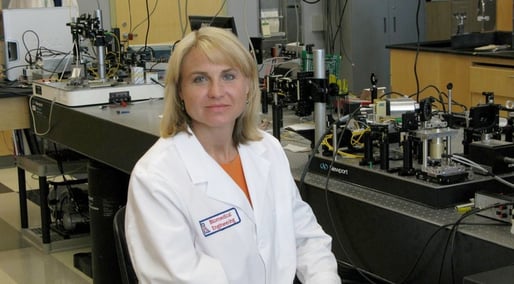 (Dr. Barton, researcher at the University of Arizona. Photo courtesy of U of A)
(Dr. Barton, researcher at the University of Arizona. Photo courtesy of U of A)
The National Cancer Institute is funding a million dollar study at the University of Arizona to help detect ovarian cancer sooner. It is hoped this project will lead to the first effective screening test for a disease that kills 14,000 women a year and often gives little to no warning of its presence until it’s too late.
Read More
Tags:
University of Arizona,
University of Arizona Tucson Research,
Arizona,
UAZ,
Biotechnology Vendor Fair,
Research Funding,
Tucson,
University of Arizona Tucson,
UA,
ovarian cancer,
2016,
cancer reserach,
Dr. Jennifer Barton,
Optical imaging technology
 Downy mildew, a fungus-like pathogen, is a major threat to crops around the country. Cucurbit crops like squash, cucumber, and melons suffered from a downy mildew outbreak in 2004 that initially only affected crops in the southeastern United States but later spread throughout the Midwestern region, and is still affecting these foods today. Michigan is a state where crops are greatly affected by downy mildew. A team of researchers from Michigan State University will be leading a $2.3 million project, granted by the U.S. Department of Agriculture, to develop methods to manage downy mildew. (Image courtesy of Kerstin Ellen Hantschel via Wikimedia Commons)
Downy mildew, a fungus-like pathogen, is a major threat to crops around the country. Cucurbit crops like squash, cucumber, and melons suffered from a downy mildew outbreak in 2004 that initially only affected crops in the southeastern United States but later spread throughout the Midwestern region, and is still affecting these foods today. Michigan is a state where crops are greatly affected by downy mildew. A team of researchers from Michigan State University will be leading a $2.3 million project, granted by the U.S. Department of Agriculture, to develop methods to manage downy mildew. (Image courtesy of Kerstin Ellen Hantschel via Wikimedia Commons)
Read More
Tags:
Michigan State University,
Midwest,
agriculture,
new research funding,
MI,
East Lansing,
MSU,
2016,
BioResearch Product Faire,
vegetable crops,
downy mildew
 Researchers around the world are constantly studying ways to create new treatment methods to fight cancer. With so many different forms of cancer, using one treatment method is not always effective for everyone battling this disease. Recently, a team of scientists in Chicago teamed up to create a new treatment method. Researchers from the University of Chicago and the biotechnology company Evelo Biosciences have partnered to develop a new microbiome-based immunotherapy treatment method for fighting cancer.
Researchers around the world are constantly studying ways to create new treatment methods to fight cancer. With so many different forms of cancer, using one treatment method is not always effective for everyone battling this disease. Recently, a team of scientists in Chicago teamed up to create a new treatment method. Researchers from the University of Chicago and the biotechnology company Evelo Biosciences have partnered to develop a new microbiome-based immunotherapy treatment method for fighting cancer.
Read More
Tags:
Midwest,
microbiome,
immunotherapy,
University of Chicago,
cancer research,
Chicago,
Front Line event,
IL,
UChicago,
2016,
BioResearch Product Faire,
cancer therapy,
Evelo Biosciences,
microbiome immunotherapy
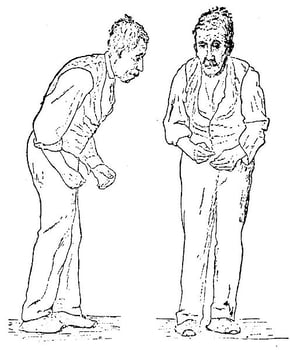
(1886 Sketch of Person with Parkinson's by Sir William Richard Gowers Courtesy of Wikimedia Commons)
Researchers at the University of Alabama, Birmingham have discovered a potential new approach to reducing the damage done by Parkinson's disease. They found that suppressing a key cell-signaling pathway in the brain lessened the destructive inflammation and nerve degradation in the area of the brain affected by Parkinson’s. In the study, rats were used to model the disease by inducing an overexpression of a-synuclein, a protein that is abundant in the human brain. The accumulation of α-synuclein is a core feature of Parkinson’s disease. This accumulation leads to the activation of the brain's immune cells and the production of inflammatory signaling chemicals, which leads to neurodegradation. The rats that were then given a JAK/STAT pathway inhibitors (known as Jakinibs) did not have the immune response, the inflammatory activation, or the neurodegeneration that those that did not receive the inhibitor experienced.
Read More
Tags:
Parkinson's Disease Research,
Alabama,
University of Alabama,
University of Alabama Birmingham,
UAlab,
Birmingham,
AL,
University of Alabama at Birmingham,
2016,
Parkinson's Disease
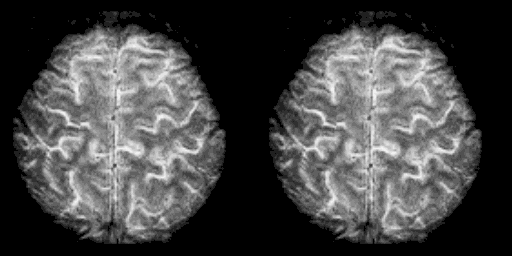
(Image of brain by functional MRI via Wikimedia Commons)
Cognitive neurologist, Rosie Cowell of the University of Massachusetts, Amherst received a nearly $600,000 grant from the National Science Foundation. The funding will be used to develop and test her theory of how fine-grained visual perception interacts with the area of the brain critical to memory.
Read More
Tags:
University of Massachusetts Amherst,
University of Massachusetts,
Bioresearch event,
brain research,
MA,
research grant,
Amherst,
UMASS,
Bioreseach,
2016,
fMRI,
Rosie Cowell
 Neuroscience and genetics are two important topics life scientists are consistently studying. Researchers from UC Davis found a promising treatment for Huntington's Disease, while UC San Francisco was awarded $185 million to build a new neuroscience research institute. Recently on the East Coast, a team of researchers from the Columbia University Medical Center discovered a new neurodevelopmental syndrome as well as the genetic makeup of the mutations that cause the syndrome. (Image courtesy of Allen Ajifo via Wikimedia Commons)
Neuroscience and genetics are two important topics life scientists are consistently studying. Researchers from UC Davis found a promising treatment for Huntington's Disease, while UC San Francisco was awarded $185 million to build a new neuroscience research institute. Recently on the East Coast, a team of researchers from the Columbia University Medical Center discovered a new neurodevelopmental syndrome as well as the genetic makeup of the mutations that cause the syndrome. (Image courtesy of Allen Ajifo via Wikimedia Commons)
Read More
Tags:
Northeast,
Columbia University,
Neuroscience,
Columbia,
Genetics,
Neurology,
NY,
Columbia University Medical Center,
2016,
BioResearch Product Faire,
neurodevelopmental syndrome
Q fever, an infectious disease caused by the bacteria Coxiella burnetii, is common among livestock such as cattle, sheep and goats. The bacteria can be transmitted to humans through the inhalation of barnyard dust that is contaminated with animal excretion containing the bacteria. Along with passing from livestock to humans, Q fever has been aerosolized in the past and used for biological warfare.
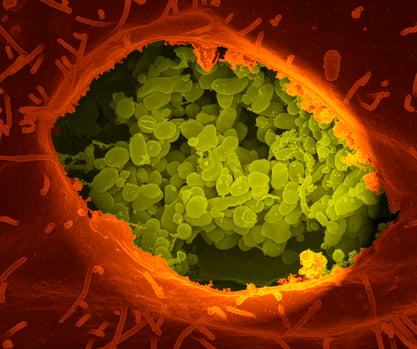
(Image Courtest of Wikimedia Commons and the National Institutes of Health)
Read More
Tags:
CA,
vaccine research,
infectious diseases,
NIH funding,
UCI,
UC Irvine,
2016,
BioResearch Product Faire,
Western,
Coxiella burnetii,
Q Fever
A pioneering new study at Ohio State University found a link between chronic stress and short-term memory issues. In the study, mice were subjected to repeated visits from an aggressive, larger intruder mouse. Researchers found that the mice repeatedly exposed to the intruder had more difficulty recalling where the escape hole was in a maze they’d mastered prior to the stressful period, compared to mice that had not been stressed.
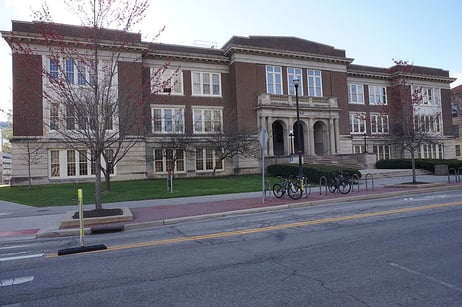
(Image Courtesty of Wikimedia Commons and Maria Rimmel)
Read More
Tags:
Ohio State University,
Ohio State,
Ohio State University life science research,
brain research,
Ohio State life science,
Ohio State life science research,
Biotechnology Vendor Fair,
Ohio State University life science,
Columbus,
OH,
OhStu,
stress,
2016,
Dr. Godbout,
memory loss






 Researchers around the world are constantly studying ways to create new treatment methods to fight cancer. With so many different forms of cancer, using one treatment method is not always effective for everyone battling this disease. Recently, a team of scientists in Chicago teamed up to create a new treatment method. Researchers from the
Researchers around the world are constantly studying ways to create new treatment methods to fight cancer. With so many different forms of cancer, using one treatment method is not always effective for everyone battling this disease. Recently, a team of scientists in Chicago teamed up to create a new treatment method. Researchers from the 



